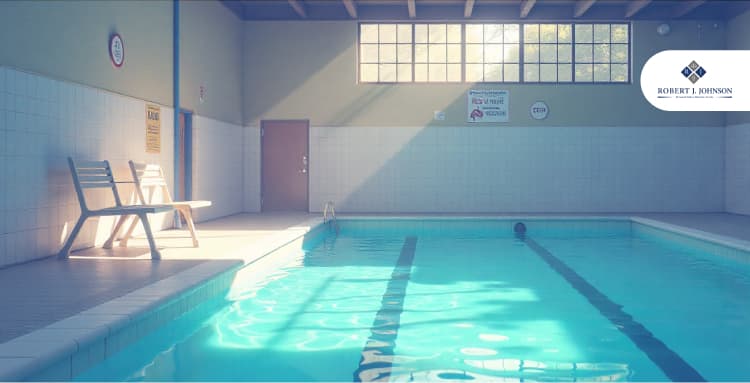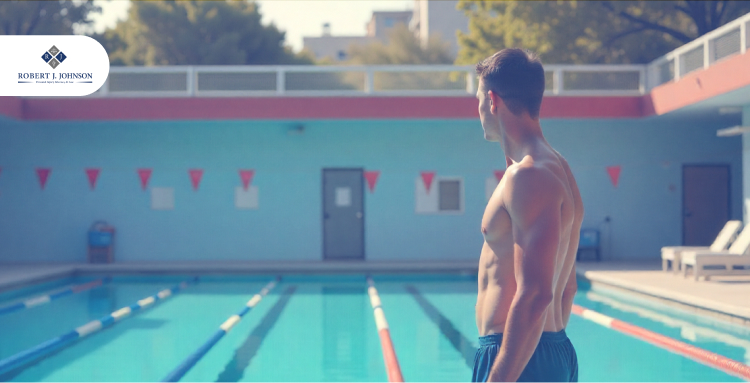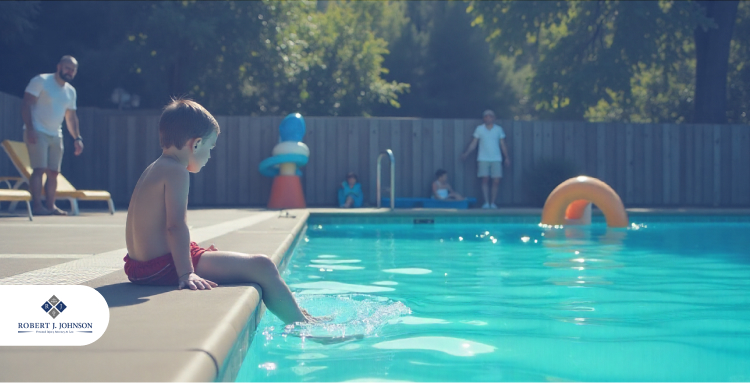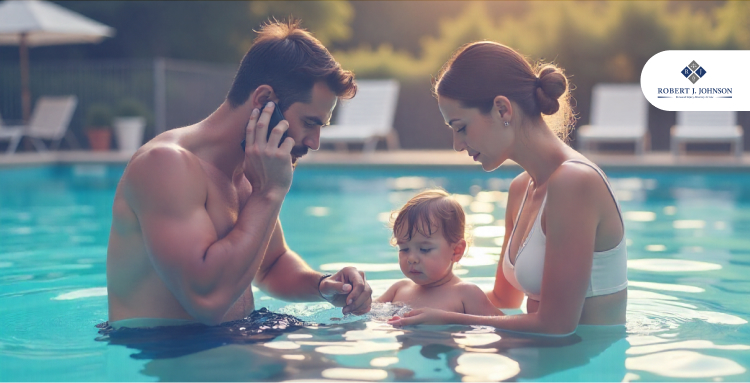
September 29, 2025
Can I Sue for a Drowning Incident at a Public Pool ?
A summer afternoon at a community pool is supposed to bring laughter, relaxation, and memories. Yet in Florida, where pools are a fixture of neighborhoods, hotels, and public parks, the risk of drowning is a reality families cannot ignore. For parents and loved ones, that day may transform a place of fun into a place of fear.
When a drowning occurs, the aftermath leaves families grieving and questioning who is responsible and whether the tragedy could have been prevented. The laws are complex, the responsibilities are layered, and the consequences are life-changing.
The real question families ask in these moments is one that carries enormous weight… Can you sue for a drowning incident at a public pool in Florida?
1) Liability in Public Pool Drownings
When a drowning occurs, identifying who may be responsible is critical. Liability can fall on a range of parties, from government entities managing public pools to private operators such as hotels, homeowner associations, or commercial pool owners. Each party has a legal duty to maintain a safe environment.
Public Pool Operators
Must provide proper lifeguard coverage.
Maintain fences, gates, and safety equipment.
Ensure the pool meets safety standards set by state and federal law.
Private Owners and Commercial Operators
Responsible for premises liability.
Must follow all safety regulations, warnings, and barrier requirements.
Negligence can arise from poor maintenance, lack of lifeguards, or unsafe pool conditions.
For children, the law recognizes pools as attractive distractions. This legal requirement means operators must take extra steps to prevent harm even if the child was not invited. Failure to do so may result in significant legal liability.
2) Florida's Legal Framework for Pool Safety
Florida law enforces strict safety rules for public and private pools. These include requirements for lifeguards, fences and barriers, proper signage, adequate lighting, and lifesaving equipment such as life rings and shepherd’s hooks. Pool operators are required to follow these measures to minimize the risk of drowning.
(I) State Safety Requirements
Chapter 514 of the Florida Statutes governs public pool safety.
So, the pools must have proper fencing and self-latching gates.
Lifesaving equipment must be accessible and functional at all times.
(II) Federal Safety Measures
The Virginia Graeme Baker Pool & Spa Safety Act mandates anti-entrapment drain covers and other safety precautions.
Violations of these standards can support negligence claims in court.
Adhering to these safety regulations is mandatory. Failure to comply may count as negligence in and of itself, allowing families to hold operators accountable more easily.
3) Sovereign Immunity and Government-Run Pools

When a drowning occurs at a city, county, or state-operated pool, families face an additional legal hurdle. That is Florida’s sovereign immunity laws. These laws were designed to protect government agencies from unlimited lawsuits; however, they do not eliminate accountability.
Families can still pursue justice if negligence played a role, but the process comes with strict rules and limits. Government entities must be formally notified of a potential claim within three years of the incident, a requirement that gives the agency time to investigate and respond. Damages are also capped by statute, meaning even when negligence is proven, compensation may be limited.
According to the Florida Statutes, claims against the state or its subdivisions are generally set at $200,000 per person and $300,000 per incident, unless the legislature approves a higher award through a claims bill.
Negligence in these cases often stems from avoidable oversights such as
Inadequate or untrained lifeguard staffing during open swim hours.
Unsafe pool conditions, including slippery decks or malfunctioning equipment.
Failure to repair known hazards, such as broken gates or defective drain covers.
The challenge for families lies not only in proving negligence but also in navigating the procedural steps that sovereign immunity laws require. Missing deadlines or failing to provide notice can permanently bar a claim, no matter how strong the evidence.
This is why acting quickly, with the guidance of an attorney familiar with these laws, is critical. Skilled legal support ensures legal and financial benefits. It means every requirement is met, preserving the family’s right to seek compensation and accountability from public entities.
4) Wrongful Death vs. Personal Injury Claims
Legal remedies depend on whether the victim survived a drowning incident. If the victim survives but sustains serious injuries, a personal injury claim can be pursued to cover medical costs, rehabilitation, and ongoing care.
Learn about your legal options and more about what constitutes wrongful death in Florida. Legal Insights and Options In cases where the drowning results in fatality, a wrongful death claim allows family members to seek compensation for funeral expenses, lost income, and emotional suffering.
Legal Time Frame (Statutes of Limitations)
Personal injury claims must generally be filed within four years from the date of the incident, according to the Florida Statutes, 95.11
Wrongful death claims must be filed within two years of the victim’s death.
Product liability claims, such as injuries caused by defective pool drains, are subject to a 12-year statute of repose from the date the product was delivered. Meeting these deadlines is essential, as missing them can prevent any legal recovery.
5) The Role of Negligence and Attractive Nuisance

Negligence remains the central basis for most drowning claims. Families must demonstrate that the pool operator failed to meet a standard of reasonable care, leading to the incident.
(I) Practical Examples of Negligence
Absence of trained lifeguards during pool operation.
Safety barriers or gates that are damaged, missing, or improperly secured.
Lifesaving equipment that is unavailable, faulty, or poorly maintained.
Ignored hazards that the operator knew or should have known about.
(II) Attractive Nuisance Considerations
Pools inherently draw the attention of children, creating a heightened duty for operators to prevent accidents.
Legal measures such as locked gates, secure fencing, and clearly visible warning signs are mandatory to mitigate risk.
These principles ensure that operators cannot overlook basic safety requirements, particularly when children are present, and they provide families with clear legal grounds to pursue claims
6) Florida Pool Safety Regulations Families Should Know
According to the Florida Department of Health, drowning is the leading cause of unintentional death for children aged 1 to 4 in the state. These tragedies show why strict enforcement of safety standards is essential across hotels, community pools, and public facilities alike.
Fencing Requirements: Pools must be surrounded by a fence at least 4 feet high with self-closing gates.
Lifesaving Equipment: Life rings, shepherd’s hooks, and first aid kits must be readily available.
Drain Safety: Anti-entrapment drain covers are mandatory under state and federal law.
Signage: Rules, depth markers, and emergency contact information must be clearly posted.
Lifeguards: Certain pools are required to have certified lifeguards during operating hours.
Failure to adhere to these standards not only increases the risk of accidents but can also serve as strong evidence in legal claims.
7) Steps Families Should Take Immediately
In Florida, the law recognizes that preventable accidents can carry serious liability. Understanding your legal options is the first step toward justice and support, and the path may be clearer than it first appears.
Then again, families facing a drowning incident should act quickly and carefully. Preserving evidence and documenting all relevant details strengthens any legal claim.
Take photographs of the pool area and any safety equipment.
Gather witness statements from anyone present at the time of the incident.
Keep medical records, emergency reports, and any communications with the pool operator.
Contact a specialized attorney as soon as possible to ensure deadlines are met.
Few things are as shocking or heartbreaking as a drowning incident at a public pool. However, early action is essential, particularly when claims involve public entities with strict notice requirements.
8) Seeking Legal Support

Having an advocate who understands both the legal and emotional dimensions of a drowning case can provide a sense of direction during an overwhelming time.
What a Lawyer Can Do
Assess liability for public and private pool operators.
Review compliance with safety regulations.
File claims within strict deadlines.
Advocate for fair compensation for medical costs, funeral expenses, and emotional suffering.
A skilled attorney can handle the intricate legal requirements, negotiate with insurance companies, and manage interactions with government agencies, allowing families to focus on healing.
Supportive Legal Representation When Families Need It
Robert J. Johnson, an experienced attorney, can take on the complexities of statutes, deadlines, and liability, allowing families to focus on healing. Every case is different, and every family deserves answers and justice. If your loved one has been affected by a pool drowning, now is the time to understand your options.
Contact Robert J. Johnson’s office today for a free consultation. Compassionate legal support is available, and taking that first step could make all the difference in protecting your rights and securing the justice your family deserves.




































































